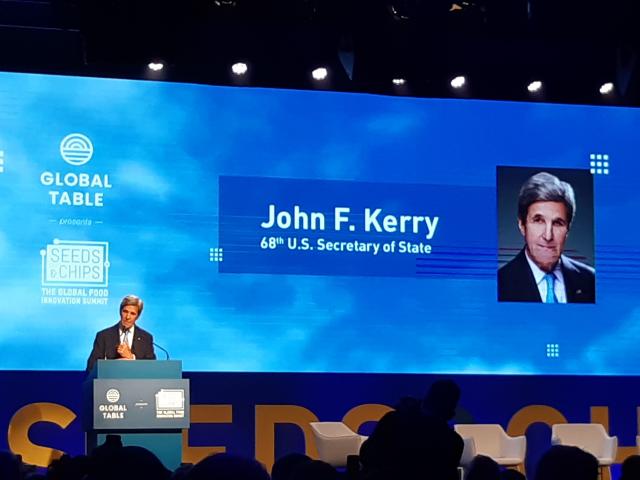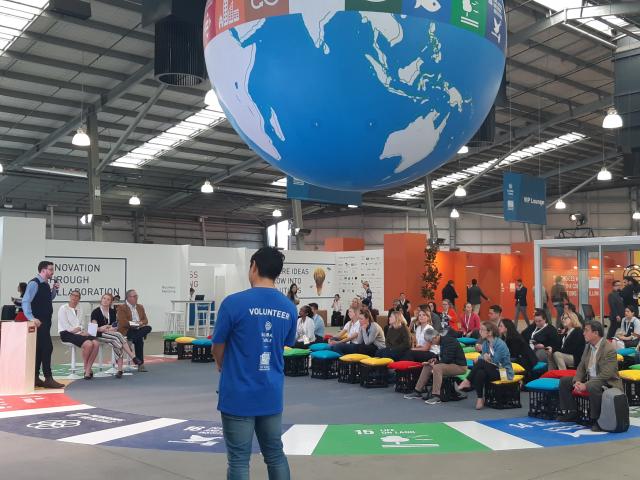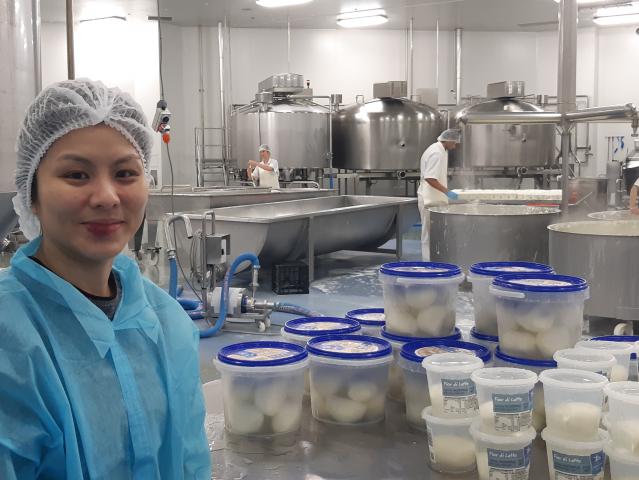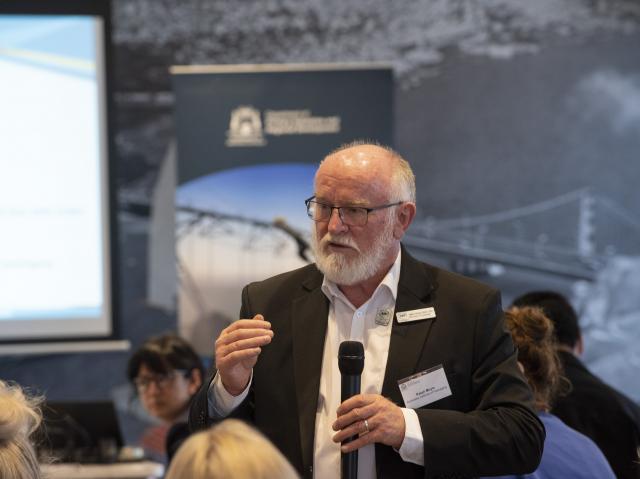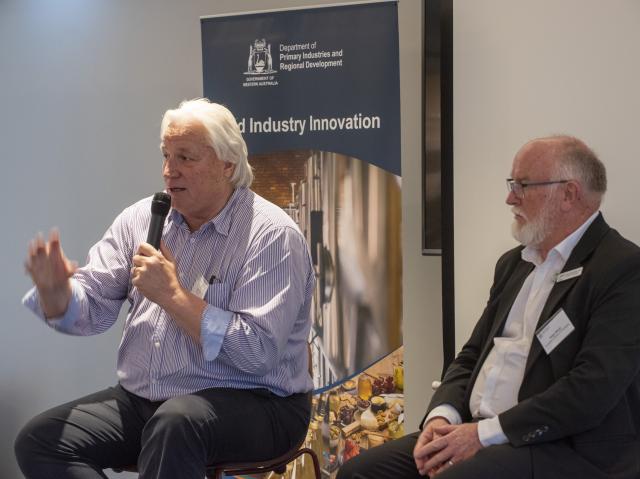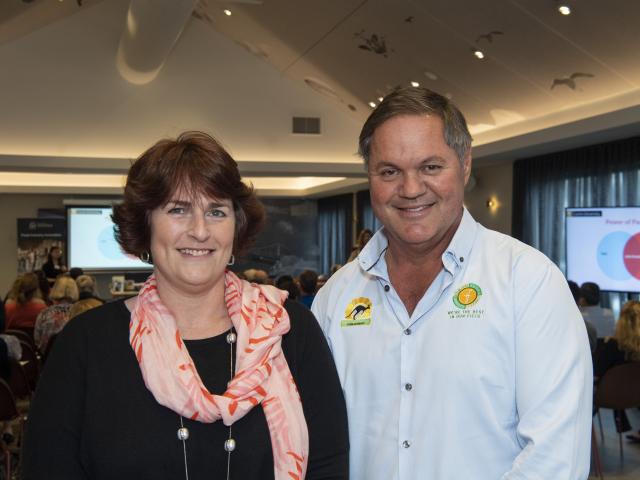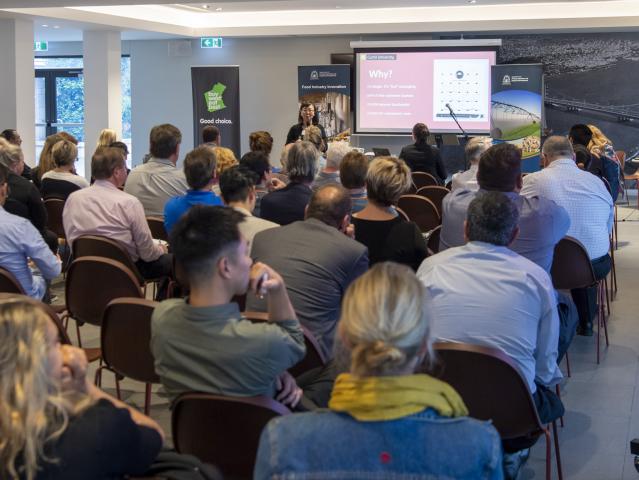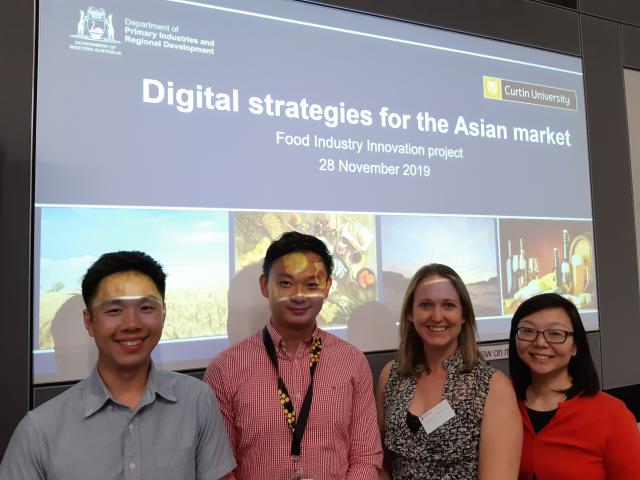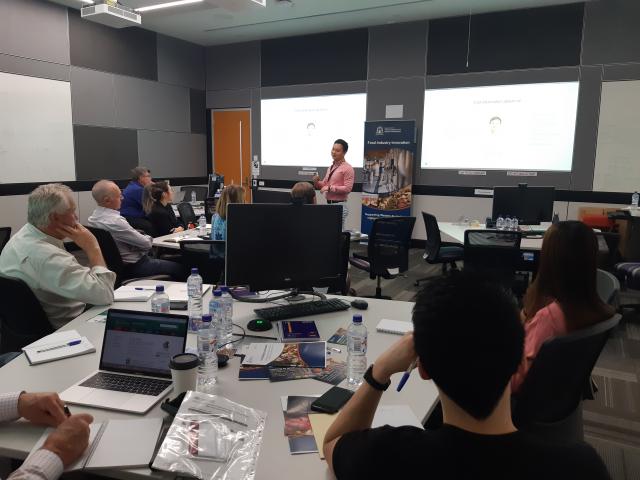Study tour invaluable to WA food and beverage businesses
Networking, relationship building, access to knowledge, conference participation and the chance to visit leading Victorian food manufacturing facilities were highlights of DPIRD Food Industry Innovation’s first Interstate Study Tour in September 2019.
Thirteen food and beverage businesses from Western Australia were selected for the tour, with the cost partially subsided by DPIRD.
The itinerary included food and beverage manufacturing site visits and was centred around the inaugural Global Table Conference which attracted more than 2700 delegates from 25 countries and featured 200 speakers across 50 sessions over the four day program.
Heading out of Melbourne, the first stop on day one was Parwan Valley Mushrooms where participants were taken through every step of the growing process and given insights into the planning and decision making processes by this successful business.
"Parwan Valley Mushrooms was a great example of best practice. In our industry (insect protein) there aren't many to share knowledge with. Everything from growing, packing and QA/QC this is the closest comparison". Amanda Abou Rjeily, Grubs Up Australia.
The tour then continued to Ballarat where a facilitated sprint design workshop allowed for networking, critical and innovative thinking with City of Ballarat food and beverage businesses.
"It is rare to have uninterrupted time and space in business to indulge in creativity. The segment devoted to design thinking allowed that precious space and time to get creative and collaborate with like-minded people. Loved it!" Laila Gampfer, Rawesome.
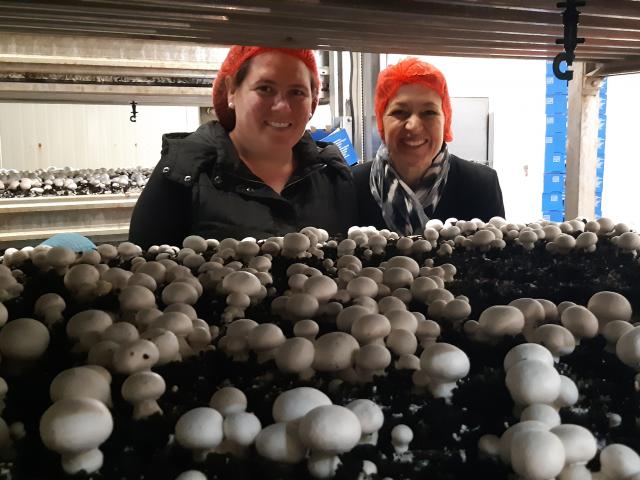
Day two was spent at the inaugural Australian Global Table conference entitled ‘Feeding our Future’, hosted by the Victorian government and presenting Seeds & Chips ‘The Global Food Innovation Summit’, focused on climate change, food waste and sustainability. The day began with an inspiring and rousing keynote address from John F. Kerry, 68th US Secretary of State calling for urgent and dramatic action on climate change, food waste and energy policy. Kerry is a passionate advocate for climate change policy and presented undeniable evidence of the need for change but was optimistic of our ability to make the right choices and turn this around.
“By being here today you are part of the solution,” Kerry said. He was very motivating and his passion and energy flowed through the venue for the remainder of the day.
'Teenovators' aged 13-19 from all over Australia were invited to apply and were selected to open each conference session with a message. The tour were excited to meet Bella Burgemeister a passionate young climate activist and author of Bella's Challenge from WA. Bella spoke before John F. Kerry’s opening address.
At the conference dinner, participants were also excited to meet WA Teenovator Luke de Laeter of Luke's Bees who funded his Global Table trip with proceeds of his business which he operates one day a week on special leave from high school. Luke is passionate community education around beekeeping and the importance of bees. Luke valued making connections with some of Western Australia’s honey bee industry members on the tour.
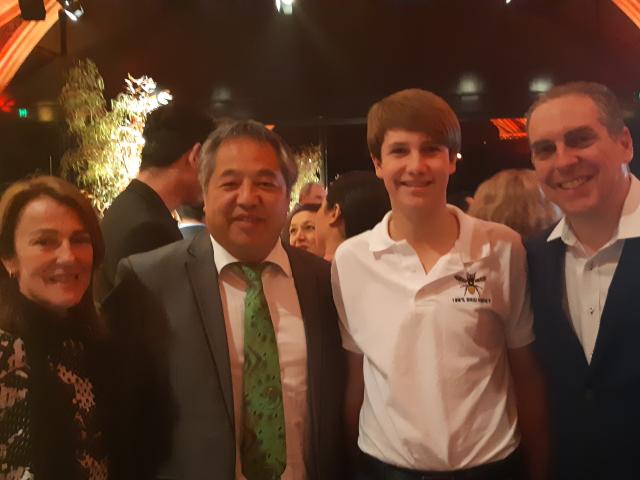
The tour continued on day three with a tour of Costco’s Docklands warehouse which proved eye opening for participants as they considered the scale they would need to achieve to become a Costco supplier. Although everything is on a LARGE scale (including the trolleys) Costco contend it is high quality. Costco are the third largest global retailer and have 772 warehouses world wide, 11 are in Australia. Western Australia's first store is due to open at Perth Airport in May 2020 with a second scheduled for Kwinana later the same year.
The afternoon was then spent back at the Global Table conference, squeezing in more panel topic discussions and exploring the innovation and trade exhibitions. Austrade prepared a comprehensive presentation for our WA delegation who had the rare opportunity to hear from Trade Commissioners to China, Japan, India and South East Asia all in Melbourne for the conference.
“The sessions that stood out for me are those around waste innovation. It made me start thinking about all the waste we have in agriculture and how we can use that waste in other ways, so it’s not just a single product, but a supply chain product”. Tracey Hodgkins, Southern Dirt Inc.
Site visits to two dairy manufacturers on day four allowed tour participants to talk to marketing staff and managers, gaining insights into the strategies that have worked for these businesses. Access to the production floor and seeing two contrasting production systems was also a highlight.
- that’s Amore! cheese produce more than forty types of stretch mozzarella style cheese, many of them labour intensive hence the business name and motto ‘ the key is love’.
- Chobani, who landed in Australia in 2012, climbed to be #1 yoghurt brand in five years, producing yoghurt 24/7 in a nearly 100% automated factory.
“Chobani have executed a perfect plan in a very short period of time. They have brought a business into reality. We need to remember (to focus on) what the market wants and not as producers get too bogged down in production and our physical assets, and make sure that the consumer is front and centre of our minds”. Ryan Walsh, The Farmhouse Margaret River.
The tour wrapped up on day five day after participants visited two of Australia's leading Food Innovation Centres, Monash Uni and CSIRO. Monash began their Food Incubator program in 2018. Businesses are able to access Monash's in-house recipe development assistance, prototype development (including 3D printing), label design and consumer testing, making their journey to commercialisation less risky. It also helps back their pitch to retailers when they can present tried and tested consumer research.
The group were particularly impressed with 'the Cave' virtual supermarket and eye tracking heat mapping which shows hot and cold spots on the shelf. This technology can also be applied to product labels.
CSIRO's Food Innovation Centre in Werribee focuses on food technology and consumer taste testing among many other areas of research and development. Here businesses can make use of various food processing machines on commercial scale which can be easily moved around and connected in sequence as required. From testing the scale up of new recipes to improving process efficiency, this centre is versatile and the staff highly knowledgeable.
Feedback collected shows participants found the tour invaluable and plan on making changes to their businesses as a result of what they have learned. Food businesses put study tour knowledge into practice details some of these outcomes. They also found new friendships, mentoring and collaboration opportunities in their peers from WA.
“Being part of this group has been fantastic, I’ve met all these people that I wouldn’t have come into contact with otherwise. We’re not in the same business but we’re in the same state. We have the same common factors.” Fiona Marshall (Torbay Asparagus)
“On the tour you could walk out and chat with like-minded people about what you’ve just seen. You can throw ideas around and others will come up with something you hadn’t thought about - it gives you immediate feedback. DPIRD have made it an interesting tour for us, there’s been something for everyone from a small producer to a large producer. It’s all about cooperation and working together, building confidence in what we’re doing.” Adam Wilson (Great Southern Truffles)
Getting the packaging right
A strong interest in sustainable packaging and trends resulted in the Department of Primary Industries and Regional Development (DPIRD) delivering a packaging forum to the WA food and beverage industry in October 2019. DPIRD’s Food Industry Innovation partnered with the Australian Institute of Food Science and Technology and the Australian Institute of Packaging to deliver the full day program which attracted nearly 100 attendees.
Participants included primary producers, small and large scale food and beverage manufacturers, food service companies, industry service providers, school teachers, tertiary institutions and government departments who indicated the content of presentations, Q & A sessions and networking opportunities was invaluable to their business’ packaging decisions.
The day commenced with a presentation by John Day from Shopability on tailoring packaging size and solutions according to channel noting that packaging needs to be core to your business strategy. He suggested that businesses ask themselves if there is enough value in waste reduction to propose an alternative packaging solution. One attendee noted that their percentage of waste for their fresh product was reduced from 60% to 4% by the use of simple plastic bags.
Australian Institute of Packaging trainer Ralph Moyle explored challenges around packaging design and its role in sustainability, recycling, reducing food waste, food safety and shelf life extension.
“Packaging design and reducing the number of materials in your packaging should be the first consideration. Recycling should be your last choice” he said.
When considering sustainable options, he suggests talking to your (packaging) supplier and finding out the facts. And to consider how you can re-use your own incoming ingredient packaging, through repurposing.
“Tell your consumers these stories” Mr Moyle said.
Afternoon sessions featured Sue Daubney from Bannister Downs Dairy and Jim Trandos from Trandos Farms talking about their journey to implement innovative sustainable packaging, followed by a question and answer session providing an opportunity for attendees to hear first-hand some of the challenges they faced.
Sue started the business in 2004, with their packaging system being one of their key decisions from the beginning. Bannister Downs were the first to use Ecolean packaging for fresh milk and have continued to work closely with the manufacturer to improve the process ever since. Read more about her packaging on the Bannister Downs website.
Jim has spent the last five years working with his supplier to create a Trandos Farms packaged tray-less cut corn product for the supermarkets. In May this year they successfully launched the product resulting in savings on packaging consumables but the trade off was a small reduction of shelf life as there is now less air in the final product.
Dr Min Teah from Curtin University, School of Marketing wrapped up many of the day’s learnings giving a lively and engaging talk on consumer trends and insights related to packaging and its branding.
“Packaging is part of the consumer experience and journey, from purchase all the way to disposal” she said.
“Packaging is part of your product, it creates magic through sensory experience and contributes to logic or rational reasoning for the consumer”.
Dr Teah identified trends including convenience, simplicity (in the design and how it works, not necessarily look and feel), sustainability (as important for export markets as for domestic), technology-enabled solutions and the importance of creating a unique experience.
She encouraged manufacturers to talk to their consumers, use research, trial and error, biometrics and other analytical testing of their packaging to ensure they are unique and stand out in the marketplace.
Packaging suppliers Romel Australia and SelectEquip showcased some of the latest in packaging solutions and a networking event supported by Buy West Eat Best concluded the day with more than 60 attendees staying to connect and share insights from the day.
If you missed the forum, the presenter’s slides are available on DPIRD Food Industry Innovation’s past events and seminar resources page.
Curtin marketing collaboration
A collaboration agreement between DPIRD’s Food Industry Innovation project and Curtin University’s School of Marketing kicked off in November with the delivery of two marketing short courses for WA food and beverage businesses on 27 and 28 November.
Brand Design and Strategy, delivered by Dr Min Teah, senior lecturer at Curtin University was oversubscribed with more than thirty businesses attending to discuss key factors to success. The workshop gave participants a better understanding of branding and brand strategy and worked through relevant case studies and best practice examples.
Dr Teah shared her knowledge, taking the businesses through the process of how to strengthen their brand and create a strategy for long-term growth and success. Participants were encouraged to work through their own brand value, beliefs, purpose and personality as part of creating a brand strategy.
Following strong interest and support from the Kimberley region, DPIRD’s Agribusiness Food and Trade team partnered with Curtin, Kimberley Development Commission, East Kimberley Chamber of Commerce and Industry and the Shire of Wyndham East Kimberley to deliver the Brand Design and Strategy workshop to Kununurra food and beverage producers in early December.
Melanie Gray from Ceres Farm attended the Kununurra event and said that Min motivated her to look at her business and find ways to improve.
“Understanding and knowing your brand design and marketing strategy is vital to the running of a good business” she said.
“It is also important to understand your customers”.
Ms Gray thanked Dr Teah for sharing her in-depth knowledge of marketing, and for the reminder to tell our story to our customer authentically.
Dr Mingming Cheng, senior lecturer at Curtin University presented Digital Strategies for the Asian Market, showing participants common mistakes to avoid and key strategies to consider to increase your product’s chances of success.
Dr Cheng presented a comprehensive picture of the digital landscape and consumer in Asia showing how the use of and demand for e-commerce is growing at a rapid rate. He also discussed the importance of cultural values and how unintentional misunderstandings could easily offend or send the wrong message and negatively affect business outcomes.
Dr Cheng worked through examples of how to strategize your social media campaign including setting goals, identifying your audience and researching competitors before creating any content.
Nardia Stacy, Executive Manager of Pomewest said the workshop content was extremely relevant and useful for their grower base looking to export to Asia.
“The insights presented opened my eyes to the differences in social platforms and the importance of cultural considerations when approaching marketing in this region” Ms Stacy said.
“The one size fits all approach to digital may not be appropriate when you are targeting this market” she said.
Further workshops along with a program of student internships and consumer insight research will be delivered in early 2020. Please email foodindustryinnovation@dpird.wa.gov.au with your expression of interest in these programs.


